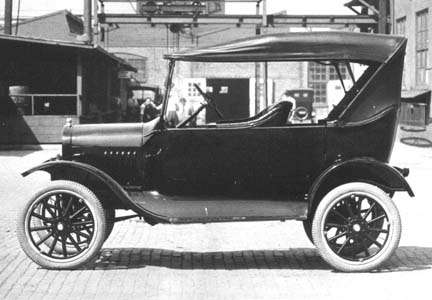When bowling merrily along, you hear a sudden metallic bang, and you jump to the conclusion that some vital part of the framework must have snapped. Keep calm. It's only a stone thrown up from the road by one of the tyres, which has hit one of the mudguards, or the underside of the body. Drive on; all's well!
Or, on a rainy day, there may fall on your anxious ear a sound as of distant church bells. It will persist, and grow louder, but still you don't see the belfry. Ultimately you will come to the right conclusion that the tinkling arises from the back wheels. Most novices at this point jack up the back wheels, and, at the expense of much mud on hands and clothes, turn them, to find that the noise undoubtedly does arise thence. But those back wheels seem terribly stiff; they will only budge under a hefty pull, and stop turning at once. Then comes the false conclusion - that the noise and the stiffness are somehow associated, and that something is decidedly wrong.
Drive on; all is well! There is no connection whatever between the noise and the stiffness. The back wheels always turn laboriously, as it seems to you, who have hitherto only concerned yourself with the front wheels. The noise is due to minute particles of grit that have been washed into the brake mechanism. You will find that the ringing will gradually cease, if you get on to dry roads again.
Or your engine makes an obvious misfire or two, then runs merrily on. Don't immediately jump to the conclusion that you will have to take your carburetter down, or overhaul your ignition system. Of course, if the misfiring persists, you will have to take a measure to cure it, but give it a chance. Probably a speck of dirt, or a drop of water, has got into the petrol system, and is temporarily choking either the petrol inlet needle orifice or the spray needle orifice. It ought not, of course, to have got there, if you have taken due care. Being there, however, it will probably escape into the inlet pipe via the spray needle orifice, and thence again into the engine, where it will trouble you no more. Anyway, wait and see!
You stop on the road, perhaps a little more suddenly than usual, and are horrified to find a big pool of water under your radiator. A leak? Yes, in a sense - down the radiator overflow pipe. When you stopped suddenly, the water, mindful of the late Sir Isaac Newton, wanted to go on, and its only way was down the overflow pipe. Drive on; all's well!
NEXT TOPICS - Rattles, rumbles, thumps, hisses, squeaks, overheating, creeping, jerking, chattering and misfiring.
(The Original Book of the Ford, 9th Edition, circa 1924)



